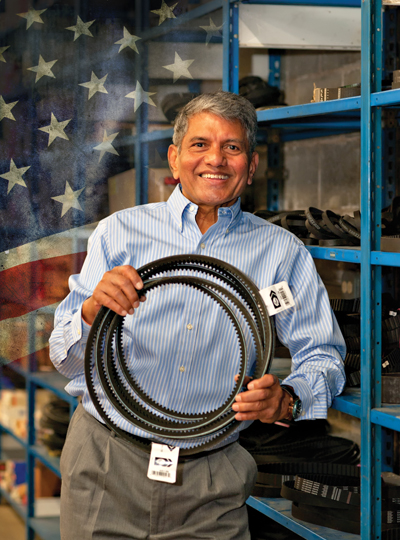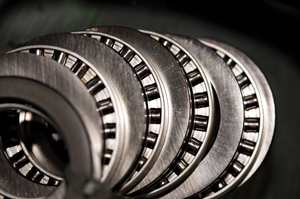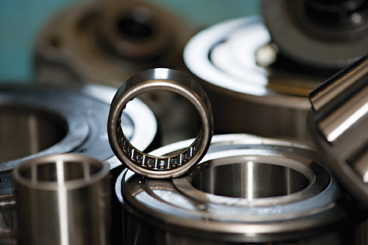An American Success Story
Minority-owned Bearings and Industrial Supply fulfills one immigrant's American dream
 |
|
Nick Shah, owner, Bearings and Industrial Supply |
By Rich Vurva
Companies that are buying independent distributors garner most of the attention among industry observers. Meanwhile, thousands of small – and usually family-owned – independents go about their day-to-day business virtually sight unseen. Their primary concern is keeping customers happy.
Bearings and Industrial Supply Co. in the Chicago suburb of Addison, Ill., is one of those companies. With just one location, 10 employees and annual sales of around $5 million, this distributor of bearings and power transmission parts and components lacks the size and scale to generate much publicity.
Yet, it has managed to maintain longstanding business relationships, in some cases lasting for more than 20 years, with companies such as Toyota, Boeing, CNH Global and the Chicago Transit Authority.
In many ways, Bearings and Industrial Supply Co. is an American success story. It’s the tale of an immigrant who came to the United States with a dream to build a future for his family.
Nick Shah arrived in the U.S. from India in 1967. After earning a degree in mechanical engineering, he spent several years working for General Bearing Company in Chicago before it was acquired by Bearing Distributors. In 1982, Shah decided to launch his own distribution company.
“My desire ever since I came to America was to own my own business. By the grace of God, I have been able to do that. This is the best country in the world. If you want to do something, you can do it, but you’ve got to work hard,” Shah says.
Working hard in the early days meant developing relationships with local electric motor repair shops to supply them with bearings. Over time, Shah diversified his product offering to include belts, seals, bushings, chains, sprockets and other industrial products. Operating his two-man shop out of a leased 1,800 square-foot warehouse, he was the only bearings distributor in Addison. As the company grew, he moved into a larger warehouse before eventually purchasing an 8,700 square-foot building in 1990, from which he still operates the business. Competition has grown as well. Bearings and Industrial Supply is one of 11 companies with Addison locations that sell bearings and power transmission products.
 Breaking into major accounts
Breaking into major accounts
Unlike a typical independent distributor that primarily serves the local marketplace, 60 percent of the company’s customers are located outside of Illinois. Shah’s biggest customer, Toyota Motor Manufacturing Kentucky, is Toyota’s largest vehicle manufacturing plant in North America. He supplies and manages an inventory of about 1,000 belts used to maintain equipment in the facility that produces the top-selling Camry, and also provides seals and MRO bearings.
It took Shah seven years to break the ice at Toyota.
He applied for and earned certification as a minority-owned business through the U.S. Small Business Administration, the Chicago Minority Business Development Council and the City of Chicago. He also qualifies as a Small Disadvantaged
Business under SBA guidelines.
That status has helped open doors at major companies and governmental units. But, Shah insists, it’s the company’s commitment to providing quality products and service at a competitive price that keeps them in business.
“I want to earn business on my merit rather than my MBE or DBE status,” Shah says.
Earning the business with Toyota required becoming familiar with the famed Toyota Production System and just-in-time and lean manufacturing principles. Belts and other parts are shipped to Kentucky only when needed, which requires maintaining enough on-hand inventory to fill orders and keeping detailed records tracking usage patterns.
It also requires a dedication to providing exceptional service. One time, Shah shipped two custom-ordered belts to the Kentucky plant. The belts arrived on time but were misplaced after leaving the stock room. At six o’clock that evening, Shah received a frantic phone call at home. “Hey, Nick, you were supposed to send us this belt. We don’t have it.”
Despite having a shipment tracking number and signature proving that the order was delivered on time, the customer was adamant that the belt was nowhere to be found and production was being held up. Shah booked a flight to Kentucky for the next morning and delivered two replacement items.
“There is no tomorrow in our business. If customers need something, they want it now,” Shah says, snapping his fingers.
 Best service and low prices
Best service and low prices
Customers also want high-quality products at competitive prices. Maintaining quality and price is often a delicate balance, especially for a small business. As one of the founding members of IDC-USA, the distributor-owned cooperative of bearings and power transmission distributors based in Indianapolis, Bearings and Industrial Supply benefits from the group purchasing power that IDC offers. Membership also enables Shah to access additional product lines.
Trend setterIn the mid-1980’s, a group of six distributors in the bearings and power transmission industry were concerned about how to compete against the “big three” distributors in the industry, Motion Industries, Applied Industrial Technologies and Kaman Industrial Technologies. The independent companies believed they had a strong value proposition that revolved around service and technical expertise, but also knew it would become increasingly difficult to compete on price against the big powerhouses. Nick Shah was one of six originating members of what was then known as the Independent Distributors Association. To avoid being confused with the Industrial Distribution Association, the group changed its name to the Independent Distributors Cooperative-USA (IDC-USA). On Nov. 8, 1988, now 10 members strong, IDC-USA was formally incorporated. Jack Bailey, president and CEO of IDC-USA, credits Shah and the other founders of the group for having the foresight to establish a first-of-a-kind cooperative focused on the bearings and power transmission industry. “If you look at any kind of growth, it involves stepping out of your comfort zone. A lot of Nick’s success is that he has great business acumen, he’s a very conservative businessman, but that doesn’t prevent him from stepping out of the comfort zone when he sees growth opportunities,” says Bailey. Cooperatives have been around since 1752, when Benjamin Franklin founded a mutual insurance company in Philadelphia. Despite the success of independent hardware store cooperatives such as Ace Hardware, True Value and Do It Best, the concept was new to the power transmission distribution industry. “It took some guys like Nick Shah that aren’t afraid to try something new,” Bailey says. “From a business standpoint he’s extremely courageous in that he’s never afraid to step out of his comfort zone. He did it by coming over here, he did it by getting into this industry and he’s done it in finding a niche in minority contracts and in being one of the founders of IDC-USA.” |
“We can’t carry every product line and, without all the lines, you cannot do the right job for customers,” Shah says.
When a customer in another state needs a product on an emergency basis and can’t wait for shipment, Shah has gone to a nearby IDC distributor to arrange same-day pick up or delivery. “I’m not a direct distributor with SKF, but if I need an SKF product, I can get it from another IDC Distributor,” Shah points out.
He also utilizes IDC’s two distribution centers, in Indianapolis and in Reno, Nevada, and drop-ship and direct-ship options from IDC preferred suppliers, which reduces his inventory carrying costs.
“Membership in IDC has been a big benefit to our company,” Shah explains. “It has helped us not only in obtaining better pricing so we can compete against bigger competitors, but it gives us access to more products and services that we can offer our customers.”
He promotes IDC’s private label brand, called Select, to customers who are looking for high-quality, competitively priced products.
“With IDC Select, we have control over the quality of the product,” Shah says.
If customers who don’t want to pay for name brand products are looking for cheaper alternatives – which are typically imported from overseas – he stresses the importance of quality. “I don’t like to sell cheap bearings that may fail. I’d rather they pay 50 cents or $1 more for the bearing and be able to give the customer a one-year warranty instead of a
90-day warranty,” he says.
Before providing a bearing or other product to a customer, he makes sure that it offers the load capacity and tolerances appropriate for the application. “Even though they may want good prices, our customers still rely on us for our technical expertise,” he adds.
On occasion, Shah has turned down business because he felt it would stretch his company too thin and result in fulfillment problems. When long-time customer Kodak asked Shah to bid on an integrated supply contract at its Rochester, N.Y., facility, he decided to walk away from the opportunity. It would require expertise in product lines that his company didn’t offer. The decision was not easy because it resulted in Shah closing a Rochester branch that was dedicated to serving Kodak.
“I tell my people that if somebody calls with a $100,000 order and you know that we will not be able to fulfill it when they need the material, just be honest with them about the delivery deadline,” Shah says. “We may lose that big order but at least we won’t lose that customer. I want to keep the customer happy.”
That honest approach with customers is a major reason that this small independent has managed to survive in a competitive marketplace.
Shah doesn’t seek publicity, but has received his share of accolades during his long career. In 1998, he received the Minority Businessman of the Year award from the St. Louis Minority Business Council in recognition of work done for Boeing. He was one of just 120 businesspeople invited by then-President Bill Clinton to visit the White House for an event to mark the signing of the North American Free Trade Agreement. While at the White House, he was interviewed for an appearance on an ABC network news broadcast.
Although public recognition is nice to receive, Shah’s primary motivation is keeping customers happy. It may not attract a lot of attention, but it has helped Shah fulfill his American dream.
This article originally appeared in the Sept./Oct. 2014 issue of Industrial Supply magazine. Copyright 2014, Direct Business Media.













